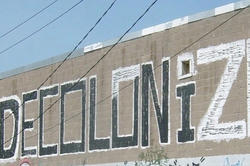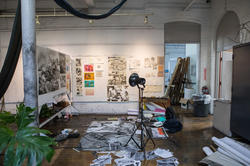Faculty, curators and librarians come together for a semester-long seminar on decolonization that builds on the institution’s commitment to advancing social equity and inclusion.
Five Questions: Naimah Pétigny

Last year RISD hired a cohort of full-time faculty members focused on race, colonization, decolonization, post-coloniality, cultural representation and material practices of resistance. The educators who joined the community as part of that “Race in Art & Design” cluster hire initiative began teaching at RISD in the fall and have graciously agreed to share their unique pedagogical approaches in this series of Q&As. In this interview, we hear from Literary Arts and Studies faculty member Naimah Pétigny.
Can you please say a little bit about yourself and your areas of academic focus?
I grew up in western Massachusetts embedded within a Black and brown, artsy, socially engaged community. I was a dancer and also spent a lot of time as a racial justice organizer in a youth-led political theater ensemble. We designed and facilitated intergenerational community workshops that focused on critical unlearning and building new frameworks for thinking about race, class, sexuality, gender and power.

As a scholar and educator, I engage the fields of Black studies, feminist studies and performance studies. I’m interested in what the theoretical frameworks and political agendas of these fields reveal about Blackness, gender and liberation in this contemporary moment and what colonial legacies they are unearthing. I read dance as a raced, gendered expressivity and a mode of being/living. Experimental Black dance theater performance pieces like Dancing in the Hold by mayfield brooks open up new ways of feeling and being that challenge the intimacies that have been denied to Black peoples—intimacies that are reborn through cultural production in the afterlife of slavery.
“Experimental Black dance theater performance pieces open up new ways of feeling and being that challenge the intimacies that have been denied to Black peoples.”
What attracted you to RISD?
I am totally excited to work with students who are anchored in creative, material practices and understand the deep value and liberatory power of that work.
What classes are you teaching and what challenges and opportunities do you face teaching through the lens of decoloniality?
I taught a first-year writing course in which we discussed the intimacy of past and present, haunting, the recording of history and how history itself is a combination of desires, fictions, historical violence and proliferating colonial legacies. I also taught a seminar on Black feminist experimentalism where we traced the entanglements of performance, critical theory and everyday practice to understand how these queer and urgent experimentalisms curate spaces wherein gendered and anti-Black violence is accounted for and interrupted in creative ways.
There’s a lot of rhetoric around decolonization. There is not nearly enough reflection and action about what material things would have to change about the way we move through the world in order to enact a more liberatory, collective mode of being. Decolonization is rooted in Indigenous sovereignty and Black liberation. It is also about how you relate to other people, what types of knowledges you value and uplift and how you carve out critical spaces of unlearning in the classroom. It’s about understanding the colonial legacies of violence and erasure that permeate the everyday and must be uprooted.

What’s the most important thing you hope students will learn in your classes?
I want students to understand that every class is an experiment and that these fields of study are sets of conversations that are open and responsive to students’ own lived experience and embodied knowledge—what they think and feel and know. I’m challenging the fundamental idea that the goal is to arrive at one, singular, “correct” answer—through one mode of knowledge production. Seeing students internalize the notion that we’re collaboratively developing a body of knowledge is one of the most joyous parts of teaching. That is foundational to the work of decolonization.
“Seeing students internalize the notion that we’re collaboratively developing a body of knowledge is one of the most joyous parts of teaching.”
What is your take on RISD’s current state in terms of social equity and inclusion? What would you like to see the college focus on moving forward?
It’s really important to center our desire for institutional transformation on what happens in the sacred space of the classroom. It’s not only about adding more Black and brown people to the syllabus, especially if you’re teaching in the ways you’ve always taught. We all need to be more aware of the deep violences that can be perpetuated in the classroom space. We need to push back against the subtle forms of erasure and silencing that are so deeply normalized. We have to uproot centuries-old modes of teaching and thinking to make space to move in a more decolonial way.
—interview by Simone Solondz
Read the whole series and learn more about RISD’s commitments to Social Equity and Inclusion.
February 1, 2022

